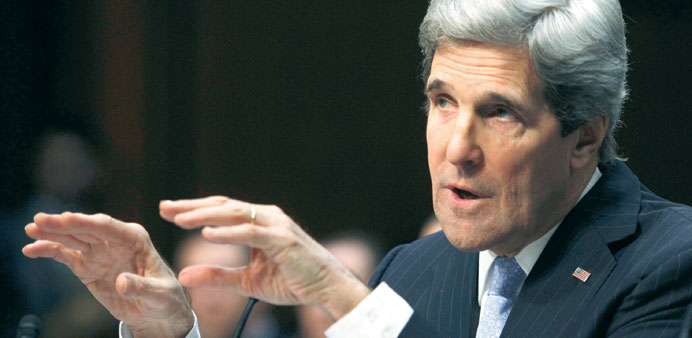Reuters/Washington
US Senator John Kerry received backslaps and lavish praise from his Senate colleagues at a hearing yesterday that left little doubt he will win easy confirmation as secretary of state.
Appearing before the Senate Foreign Relations Committee which he has chaired for the last four years, the five-term senator from Massachusetts and Vietnam War veteran was praised by Democrats and Republicans alike.
“I look at you, in being nominated for this, as someone who has almost led their entire life, if you will, for this moment, being able to serve in this capacity,” said Senator Bob Corker of Tennessee, the top Republican on the panel.
“We’re honoured to welcome you as the president’s nominee for a position you have most-deservedly earned,” said Senator Robert Menendez, the New Jersey Democrat who is chairing the hearing for the committee, which is still technically chaired by Kerry.
“You will need no introduction to the world’s political and military leaders, and will begin – on day-one – fully conversant not only with the intricacies of US policy, but with an understanding of the nuanced approach necessary,” Menendez added.
Kerry was greeted with backslaps as he arrived for his hearing and bantered easily with senators, wryly noting his role reversal after spending 29 years sitting up on the dais and questioning witnesses.
“I don’t want this to affect your opening questions, but let me say I have never seen a more distinguished and better-looking group of public officials in my life,” he said to widespread laughter.
Several senators said they were certain of his confirmation.
The one note of discord during the hearing came when a protester dressed in pink shouted “we need peace with Iran ... I am tired of my friends dying” before being removed by police.
Kerry broke no new ground in his testimony, stressing his commitment to President Barack Obama’s policy of seeking a diplomatic solution to persuade Iran to give up its suspected pursuit of nuclear weapons.
Iran says its programme is solely for peaceful purposes.
“The president has made it definitive – we will do what we can to prevent Iran from obtaining a nuclear weapon. I repeat here today: our policy is not containment,” Kerry said. “He and I prefer a diplomatic resolution to this challenge and I will work to give diplomacy every effort to succeed.”
The senator added: “But no one should mistake our resolve to reduce the nuclear threat.”
The main vehicle for diplomacy with Iran has been talks between Tehran and the five permanent members of the UN Security Council and Germany, a group collectively known as the P5+1.
Kerry said that “everybody’s very hopeful that we can make some progress on the diplomatic front now” and, without disclosing US negotiating strategy, noted Obama had made clear his willingness to have direct negotiations with Iran if need be.
His critics have said that Kerry has failed to seek tougher sanctions to discourage the Islamic Republic from pursuing its nuclear programme, but the nominee signaled that he was ready to keep the pressure on Tehran.
Kerry told Menendez, one of the Senate’s most ardent advocates of tighter sanctions against Iran, that he was “totally” committed to enforcing them.
As a senator, Kerry visited Damascus repeatedly prior to the outbreak of Syria’s devastating civil war and was a proponent of US re-engagement with Syrian President Bashar al-Assad.
Kerry said there was a moment where Assad, impelled partly by of his desire to find jobs for his “burgeoning” youthful population, had an interest in improving relations with the US but that he missed the opportunity.
“He has made a set of judgments that are inexcusable, that are reprehensible and I think is not long for remaining as the head of state in Syria,” Kerry said.
The Yale-educated son of a foreign service officer, Kerry, 69, has long been a specialist in foreign affairs. In the 1960s, he differed from some of his well-heeled peers by enlisting in the US Navy and serving two tours of duty in the Vietnam War.
He broke from – and enraged – the military establishment by becoming a prominent anti-war demonstrator after returning home.
Bitter personal attacks over that anti-war role helped cost him the presidency in 2004 when he lost to Republican George W Bush.
Kerry, who first testified before the committee in 1971 to express his opposition to the Vietnam War, choked up when recalling his father’s service as a career diplomat.
“If you confirm me, I would take office as secretary proud that the Senate is in my blood – but equally proud that so, too, is the foreign service,” he said.

Kerry, Obama’s nominee for secretary of state, faces his colleagues as he testifies before the Senate Foreign Relations committee during his confirmat
